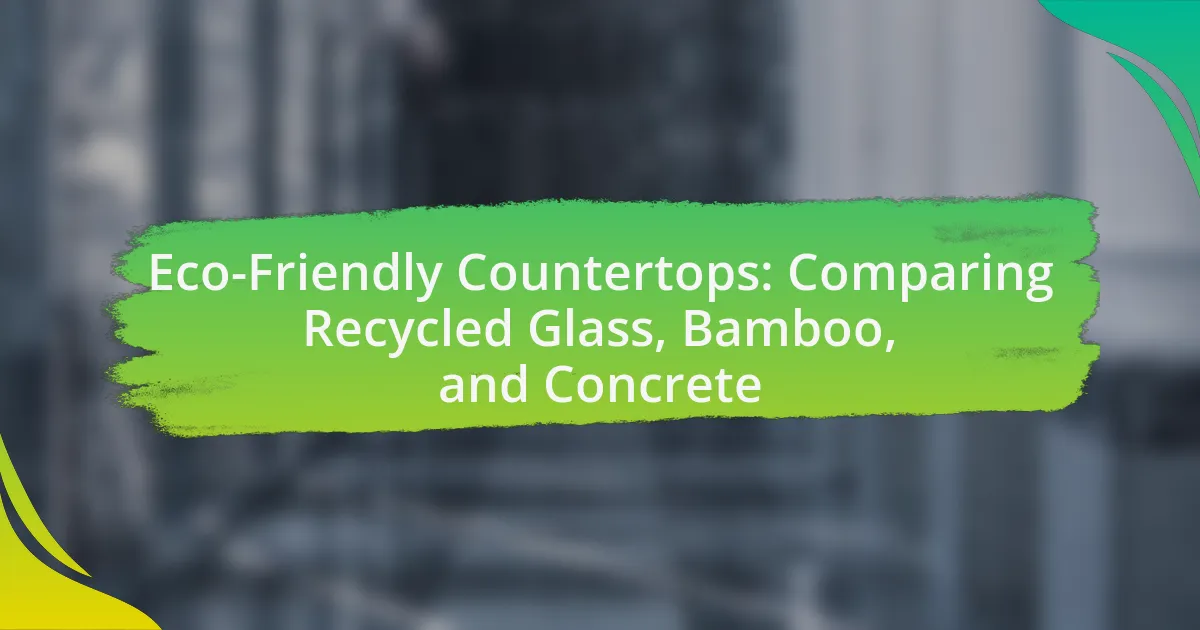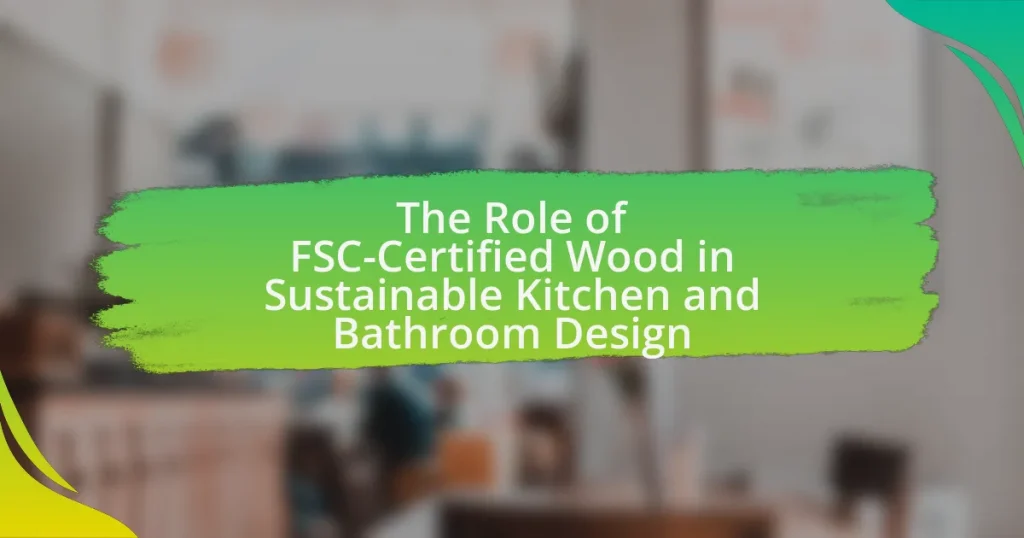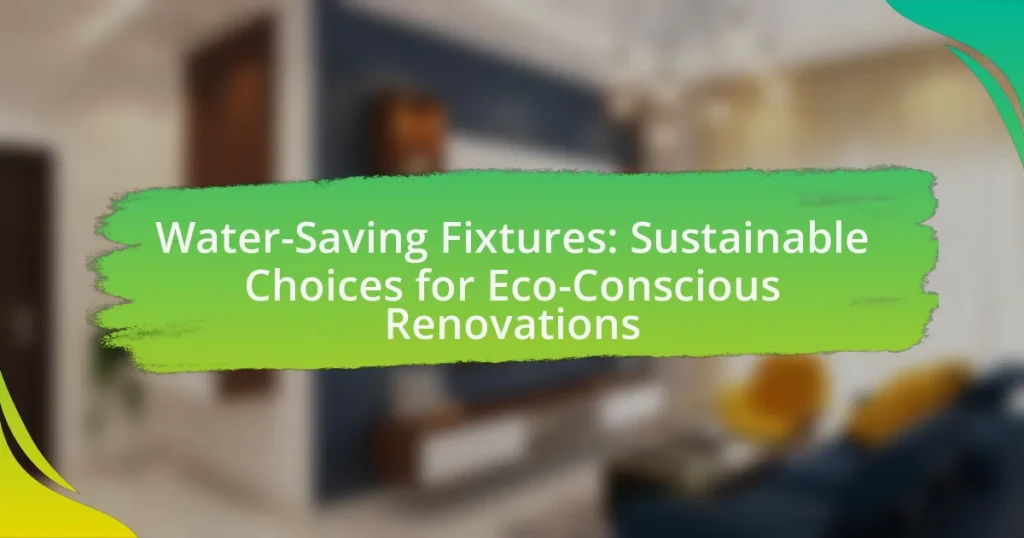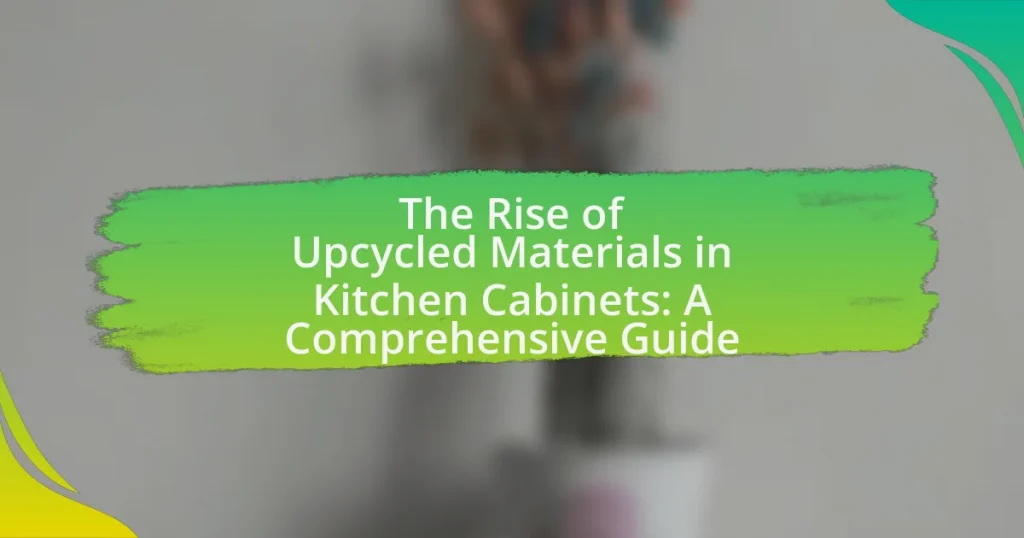Eco-friendly countertops are surfaces crafted from sustainable materials that aim to minimize environmental impact. This article compares three primary types of eco-friendly countertops: recycled glass, bamboo, and concrete, highlighting their materials, sustainability, durability, and maintenance requirements. It discusses the importance of these countertops in promoting sustainable living, their contributions to environmental conservation, and the aesthetic and functional differences among them. Additionally, the article addresses cost considerations and best practices for maintaining these eco-friendly options, providing consumers with essential information for making informed choices.
What are Eco-Friendly Countertops?
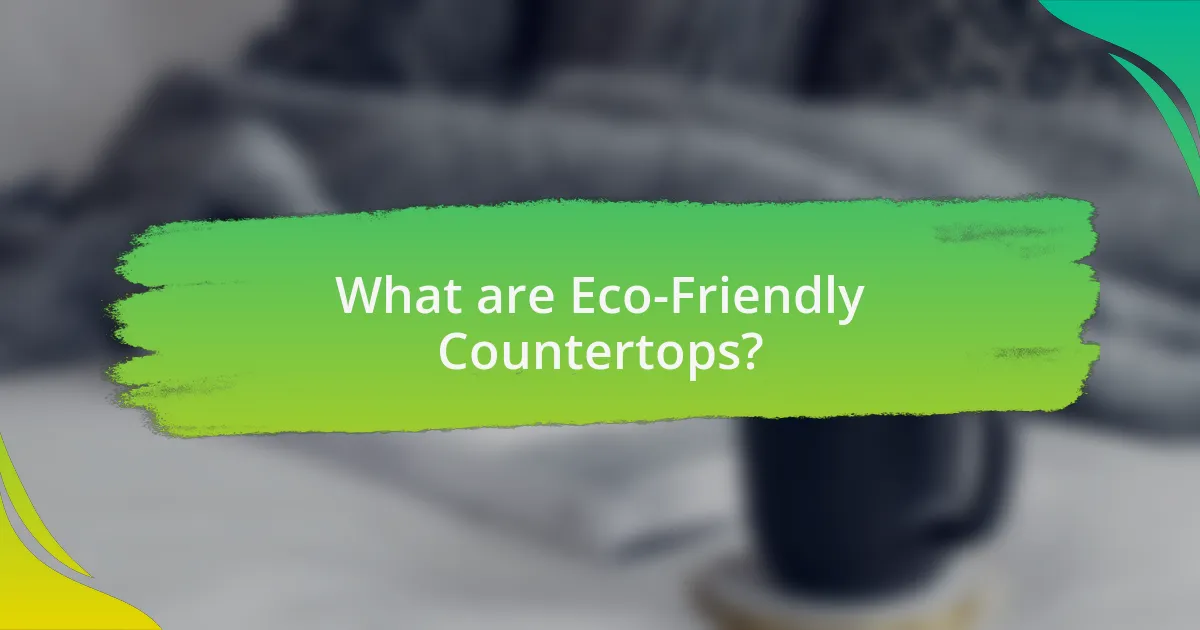
Eco-friendly countertops are surfaces made from sustainable materials that minimize environmental impact during production and use. These countertops often utilize recycled content, such as reclaimed wood, recycled glass, or rapidly renewable resources like bamboo, which reduces waste and conserves natural resources. For instance, recycled glass countertops can contain up to 80% post-consumer glass, significantly lowering the demand for new raw materials and reducing landfill waste.
Why are Eco-Friendly Countertops important for sustainable living?
Eco-friendly countertops are important for sustainable living because they reduce environmental impact by utilizing renewable or recycled materials. These countertops, made from resources like recycled glass, bamboo, or concrete, minimize waste and lower carbon footprints during production. For instance, bamboo grows rapidly and can be harvested sustainably, while recycled glass repurposes waste materials, diverting them from landfills. This approach not only conserves natural resources but also promotes a circular economy, where materials are reused and recycled, contributing to a more sustainable future.
How do Eco-Friendly Countertops contribute to environmental conservation?
Eco-friendly countertops contribute to environmental conservation by utilizing sustainable materials and reducing waste. For instance, recycled glass countertops are made from post-consumer glass, diverting waste from landfills and minimizing the need for new raw materials. Bamboo countertops are crafted from a rapidly renewable resource, which helps preserve forests and reduces deforestation. Concrete countertops can incorporate recycled aggregates, further decreasing the environmental impact associated with traditional concrete production. These practices collectively lower carbon footprints, promote resource efficiency, and support a circular economy, thereby enhancing overall environmental sustainability.
What materials are commonly used in Eco-Friendly Countertops?
Common materials used in eco-friendly countertops include recycled glass, bamboo, and concrete. Recycled glass countertops are made from post-consumer glass, which reduces waste and energy consumption. Bamboo is a rapidly renewable resource, known for its sustainability and strength. Concrete countertops can incorporate recycled materials and are durable, making them an eco-friendly option. These materials not only minimize environmental impact but also offer aesthetic versatility and durability.
What are the different types of Eco-Friendly Countertops?
The different types of eco-friendly countertops include recycled glass, bamboo, and concrete. Recycled glass countertops are made from post-consumer glass, which is crushed and mixed with resin, creating a durable and visually appealing surface. Bamboo countertops utilize rapidly renewable bamboo, which grows quickly and can be harvested sustainably, making it an environmentally friendly choice. Concrete countertops can be made with recycled materials and are often mixed with eco-friendly additives, providing a versatile and long-lasting option. Each type offers unique benefits while minimizing environmental impact.
What is Recycled Glass and how is it used in countertops?
Recycled glass is glass that has been processed and repurposed from post-consumer or post-industrial waste, transforming it into a usable material for various applications, including countertops. In countertops, recycled glass is often combined with a resin or concrete base to create a durable, visually appealing surface that showcases the unique colors and textures of the glass fragments. This use of recycled glass not only reduces landfill waste but also contributes to sustainable building practices, as it can significantly lower the carbon footprint associated with traditional countertop materials.
What are the characteristics of Bamboo as a countertop material?
Bamboo as a countertop material is known for its durability, sustainability, and aesthetic appeal. It is a rapidly renewable resource, growing up to 3 feet per day, which makes it an environmentally friendly choice. Bamboo countertops are also resistant to moisture and bacteria, providing a hygienic surface for food preparation. Additionally, they are lightweight yet strong, making them easy to install and handle. The natural beauty of bamboo, with its unique grain patterns, adds an attractive element to kitchen designs. Furthermore, bamboo is less prone to scratching and denting compared to traditional hardwoods, enhancing its longevity as a countertop material.
How is Concrete utilized in Eco-Friendly Countertops?
Concrete is utilized in eco-friendly countertops primarily through the incorporation of recycled materials and sustainable practices in its production. This approach reduces the environmental impact associated with traditional countertop materials. For instance, manufacturers often use recycled aggregates, such as crushed glass or reclaimed concrete, which not only minimizes waste but also enhances the aesthetic appeal of the countertops. Additionally, eco-friendly concrete mixes can include low-carbon cement alternatives, further decreasing the carbon footprint. Studies indicate that using recycled content in concrete can reduce energy consumption and greenhouse gas emissions by up to 30%, validating the eco-friendly benefits of this material in countertop applications.
How do Eco-Friendly Countertops compare in terms of sustainability?
Eco-friendly countertops, such as those made from recycled glass, bamboo, and concrete, generally exhibit higher sustainability compared to traditional materials. Recycled glass countertops utilize post-consumer glass, reducing landfill waste and energy consumption in production. Bamboo, being a rapidly renewable resource, grows significantly faster than hardwoods, making it a more sustainable choice. Concrete countertops can incorporate recycled aggregates and are durable, which extends their lifespan and reduces the need for replacement. Collectively, these materials contribute to lower environmental impact through resource conservation, waste reduction, and energy efficiency in their lifecycle.
What are the environmental impacts of Recycled Glass countertops?
Recycled glass countertops have positive environmental impacts, primarily by reducing waste and conserving natural resources. The production of these countertops diverts glass from landfills, where it can take thousands of years to decompose, thus minimizing landfill overflow. Additionally, using recycled glass decreases the need for raw materials, which reduces energy consumption and greenhouse gas emissions associated with mining and processing virgin materials. Studies indicate that manufacturing recycled glass products can use up to 30% less energy compared to producing new glass, further supporting their eco-friendly profile.
How does Bamboo compare to other materials in terms of sustainability?
Bamboo is more sustainable than many traditional materials due to its rapid growth rate and ability to regenerate without replanting. Unlike hardwood trees that can take decades to mature, bamboo can grow up to three feet in a single day and reaches maturity in three to five years. This fast growth reduces deforestation pressure and allows for more frequent harvesting. Additionally, bamboo requires less water and no pesticides, making it an environmentally friendly choice compared to materials like concrete, which has a high carbon footprint due to its production process. Studies indicate that bamboo can sequester carbon effectively, further enhancing its sustainability profile.
What are the ecological benefits of using Concrete for countertops?
Concrete countertops offer significant ecological benefits, primarily due to their durability and the potential for using recycled materials in their production. The longevity of concrete reduces the need for frequent replacements, which in turn minimizes waste and resource consumption over time. Additionally, concrete can incorporate recycled aggregates, such as crushed glass or reclaimed concrete, which further decreases the environmental impact by diverting materials from landfills. Studies indicate that using recycled content in concrete can reduce carbon emissions associated with production, making it a more sustainable choice compared to other countertop materials.
What are the aesthetic and functional differences among these materials?
Recycled glass, bamboo, and concrete exhibit distinct aesthetic and functional differences. Recycled glass countertops are visually striking, offering a vibrant array of colors and a glossy finish, while being non-porous and resistant to stains. Bamboo countertops present a warm, natural look with a unique grain pattern, and they are lightweight and sustainable, but they require regular maintenance to prevent water damage. Concrete countertops provide an industrial aesthetic with customizable finishes and textures, offering durability and heat resistance, yet they can be prone to cracking if not properly sealed. These differences highlight the unique appeal and practical considerations of each material in eco-friendly countertop applications.
How does the appearance of Recycled Glass countertops differ from Bamboo and Concrete?
Recycled Glass countertops are characterized by their vibrant colors and unique patterns created from glass fragments, giving them a distinctive, often shimmering appearance. In contrast, Bamboo countertops exhibit a warm, natural look with a linear grain pattern, while Concrete countertops present a more industrial aesthetic with a smooth or textured surface that can be customized in color and finish. The visual differences stem from the materials used: Recycled Glass incorporates colorful glass pieces, Bamboo relies on the natural hues of the wood, and Concrete can be molded into various shapes and finishes, allowing for a wide range of design possibilities.
What are the durability and maintenance requirements for each type of countertop?
Recycled glass countertops are highly durable, resistant to scratches and heat, and require minimal maintenance, typically needing only regular cleaning with mild soap and water. Bamboo countertops offer moderate durability, being less resistant to heat and scratches compared to glass, and require periodic oiling to maintain their appearance and prevent moisture damage. Concrete countertops are extremely durable and can withstand heavy use, but they require sealing to prevent staining and should be cleaned with pH-neutral cleaners to maintain their finish.
What are the cost considerations for Eco-Friendly Countertops?
The cost considerations for eco-friendly countertops include material prices, installation costs, and long-term durability. Eco-friendly materials like recycled glass, bamboo, and concrete often have higher upfront costs compared to traditional options, with recycled glass ranging from $50 to $100 per square foot, bamboo from $40 to $80, and concrete from $75 to $150. Installation expenses can also vary significantly based on the complexity of the material and local labor rates. Additionally, the long-term value should be considered, as eco-friendly countertops may offer greater durability and lower maintenance costs over time, potentially offsetting initial investments.
How do the prices of Recycled Glass, Bamboo, and Concrete countertops compare?
Recycled glass countertops typically range from $50 to $100 per square foot, while bamboo countertops are generally priced between $30 and $60 per square foot. Concrete countertops usually cost between $75 and $150 per square foot. This pricing indicates that recycled glass is often the most expensive option, followed by concrete, with bamboo being the most affordable choice among the three.
What factors influence the overall cost of Eco-Friendly Countertops?
The overall cost of eco-friendly countertops is influenced by material type, manufacturing processes, installation complexity, and market demand. Different materials, such as recycled glass, bamboo, and concrete, have varying costs due to their sourcing and processing methods. For instance, recycled glass countertops often require extensive processing to create a usable product, which can increase costs. Additionally, the complexity of installation can vary; for example, concrete countertops may require specialized skills and tools, adding to labor costs. Finally, market demand can fluctuate based on trends in sustainability, impacting prices.
What should consumers consider when choosing Eco-Friendly Countertops?
Consumers should consider the sustainability, durability, and maintenance of eco-friendly countertops. Sustainability involves evaluating the materials used, such as recycled glass, bamboo, or concrete, and their environmental impact during production and disposal. Durability is crucial as it affects the lifespan and performance of the countertop; for instance, concrete is known for its strength, while bamboo offers a renewable option. Maintenance requirements also play a significant role; some materials may need regular sealing or special cleaning products, which can influence long-term costs and convenience.
How can consumers assess the sustainability of countertop materials?
Consumers can assess the sustainability of countertop materials by evaluating their source, production process, and end-of-life impact. For instance, materials like recycled glass are often made from post-consumer waste, reducing landfill contributions and energy consumption during production. Bamboo, known for its rapid growth and renewability, offers a sustainable alternative when sourced from responsibly managed forests. Concrete can be sustainable if it incorporates recycled aggregates and is produced using energy-efficient methods. Additionally, certifications such as LEED or GreenGuard can provide assurance of a material’s environmental performance, helping consumers make informed choices.
What are the best practices for maintaining Eco-Friendly Countertops?
To maintain eco-friendly countertops, regularly clean them with mild soap and water to avoid harsh chemicals that can damage the surface. For recycled glass countertops, use a soft cloth to prevent scratches, while bamboo countertops should be treated with mineral oil to maintain their luster and prevent drying. Concrete countertops require sealing every few years to protect against stains and moisture. These practices ensure the longevity and aesthetic appeal of eco-friendly materials, which are often more sensitive to harsh cleaning agents compared to traditional options.
